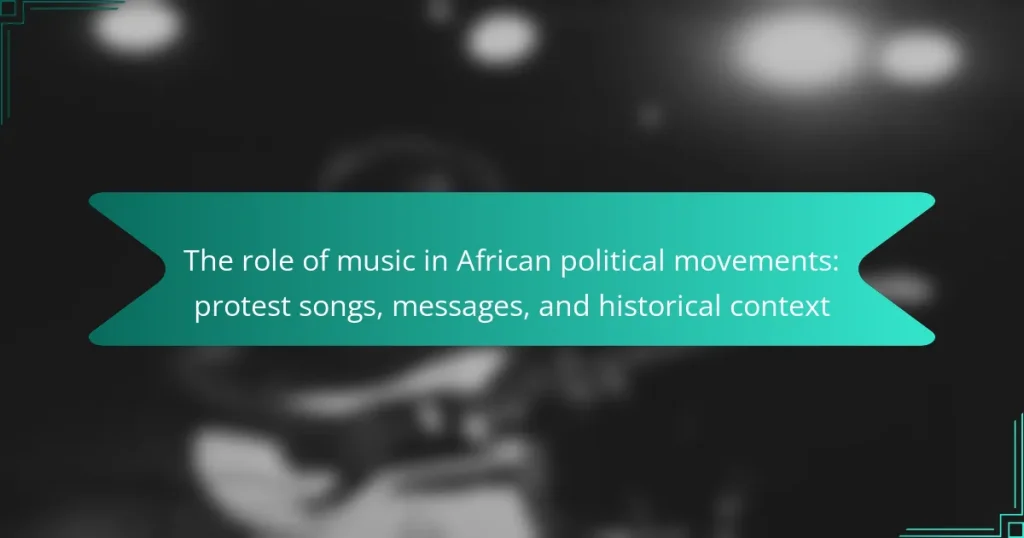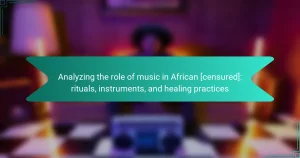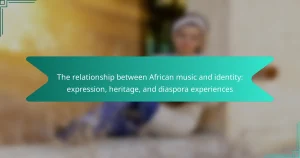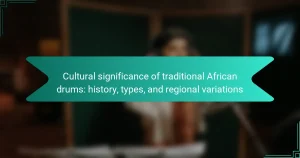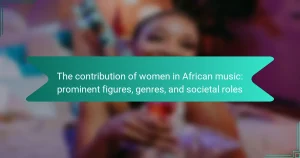Music is a powerful element in African political movements, serving as a tool for protest and social change. It conveys messages of resistance and unity, inspiring collective action within communities. Historical examples highlight the role of music in anti-colonial movements during the 20th century, with influential artists like Miriam Makeba and Fela Kuti addressing issues such as apartheid and military dictatorship through their songs. Today, music continues to be a vital form of expression in contemporary activism, mobilizing support for various causes across the African continent.
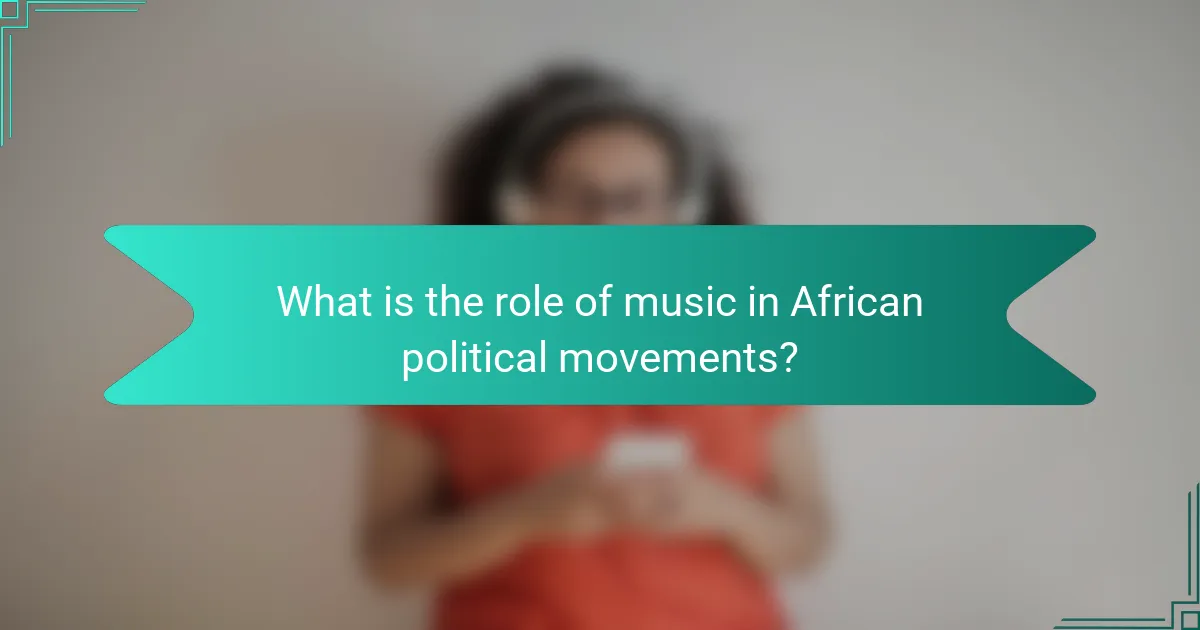
What is the role of music in African political movements?
Music plays a significant role in African political movements. It serves as a tool for protest and social change. Songs convey messages of resistance and unity. They inspire collective action among communities. Historical examples include anti-colonial movements in the 20th century. Artists like Miriam Makeba and Fela Kuti used music to challenge oppression. Their songs addressed issues like apartheid and military dictatorship. Music remains a vital form of expression in contemporary activism. It continues to mobilize support for various causes across the continent.
How has music historically influenced political movements in Africa?
Music has historically influenced political movements in Africa by serving as a tool for resistance and social change. Throughout the 20th century, artists used music to express dissent against colonial rule and oppressive regimes. For example, during the anti-apartheid struggle in South Africa, songs like “Nkosi Sikelel’ iAfrika” galvanized support for the movement. Similarly, in countries like Zimbabwe, musicians such as Thomas Mapfumo incorporated political messages into their music to inspire the fight against colonialism. Music often mobilized communities, fostering solidarity among activists. Furthermore, it provided a platform for discussing social issues, raising awareness of injustices. The rhythmic and lyrical elements of protest songs made them memorable and effective in rallying support. Overall, music has been a vital means of communication and expression in Africa’s political landscape.
What are some key historical examples of music in African political contexts?
Music has played a significant role in African political contexts throughout history. One key example is the use of protest songs during the apartheid era in South Africa. Artists like Miriam Makeba and Hugh Masekela used their music to raise awareness and mobilize resistance against racial oppression. Another example is the role of music in the independence movements across various African nations. In countries like Ghana, Kwame Nkrumah’s government used songs to promote national unity and pride. Additionally, the music of Fela Kuti in Nigeria critiqued government corruption and military rule, inspiring political activism. These instances illustrate how music has served as a powerful tool for political expression and social change in Africa.
How did colonialism shape the use of music in protest movements?
Colonialism significantly influenced the use of music in protest movements. It often suppressed indigenous cultures and imposed foreign musical norms. This led to the adaptation of traditional music forms as tools for resistance. Songs became vehicles for expressing dissatisfaction with colonial rule. They conveyed messages of unity and hope among oppressed populations. Historical examples include the use of African drumming and call-and-response patterns in protests. Music served to mobilize communities and preserve cultural identity. The incorporation of local languages in protest songs further strengthened their impact. Overall, colonialism transformed music into a powerful medium for political expression and resistance.
What are protest songs and their significance in African politics?
Protest songs are musical compositions that express opposition to political injustices and social issues. In African politics, these songs serve as powerful tools for mobilization and awareness. They reflect the struggles of marginalized communities against oppressive regimes. For example, during the anti-apartheid movement in South Africa, artists like Hugh Masekela used protest songs to inspire resistance. Additionally, protest songs often convey messages of hope and resilience. They create a sense of unity among listeners and encourage collective action. The significance of protest songs lies in their ability to influence public opinion and promote social change. They have historically played a vital role in shaping political discourse across the continent.
What themes are commonly found in African protest songs?
Common themes in African protest songs include resistance, social justice, and liberation. These songs often address political oppression and call for change. They reflect the struggles against colonialism and apartheid. Many songs emphasize unity and solidarity among the oppressed. Additionally, themes of hope and resilience are prevalent. Historical events, such as the fight for independence, serve as a backdrop for many lyrics. The songs often critique corrupt leadership and demand accountability. Overall, they serve as a powerful tool for mobilization and awareness.
How do protest songs mobilize communities and raise awareness?
Protest songs mobilize communities and raise awareness by conveying powerful messages that resonate with collective experiences. These songs often address social injustices, political oppression, and human rights issues. They serve as a rallying cry, uniting individuals around a common cause. The repetitive and catchy nature of protest songs makes them memorable and easy to share. Historical examples include “Nkosi Sikelel’ iAfrika,” which became an anthem for the anti-apartheid movement in South Africa. Research shows that music can enhance group identity and solidarity, fostering a sense of belonging among activists. Additionally, protest songs can reach wider audiences through radio, social media, and public performances, amplifying their impact. By articulating grievances and aspirations, protest songs encourage dialogue and inspire action within communities.
What messages are conveyed through music in African political movements?
Music in African political movements conveys messages of resistance, unity, and social justice. It serves as a powerful tool for mobilizing communities against oppression. Protest songs often highlight struggles against colonialism, apartheid, and dictatorial regimes. For example, South African music during apartheid expressed defiance and solidarity among oppressed groups.
These songs frequently incorporate local languages and cultural references, making them relatable and impactful. They also communicate hope and resilience, inspiring listeners to take action. Historical figures like Fela Kuti used music to challenge political corruption in Nigeria. His songs addressed social issues and called for political change.
Research shows that music fosters collective identity among marginalized populations. It creates a sense of belonging and shared purpose. In many instances, music has played a crucial role in shaping political discourse and influencing public opinion. Overall, music remains an essential medium for expressing political messages in African movements.
How do lyrics reflect the socio-political climate in Africa?
Lyrics in African music often mirror the socio-political climate by addressing issues like inequality and governance. They serve as a form of protest against oppression and corruption. For instance, songs from artists like Fela Kuti criticize government policies and human rights abuses. These lyrics can mobilize communities and inspire political action. Historical contexts show that during apartheid in South Africa, music became a tool for resistance. The lyrics of protest songs conveyed messages of hope and resilience. They also documented struggles for freedom and justice. Overall, lyrics encapsulate the sentiments and aspirations of the people during turbulent times.
What role do musicians play as activists in their communities?
Musicians serve as vital activists in their communities by using their platforms to raise awareness and inspire change. They often address social issues through their music, making complex topics accessible to a broader audience. For example, during apartheid in South Africa, artists like Hugh Masekela and Miriam Makeba used their songs to protest racial injustice. Their music galvanized public sentiment and mobilized support for the anti-apartheid movement. Additionally, musicians frequently participate in activism beyond their music. They engage in community outreach and collaborate with organizations to promote social justice. Their influence can lead to significant political and cultural shifts, as seen with the global impact of songs like “We Are the World.” Overall, musicians play a crucial role in advocating for social change and uplifting their communities through their art.
How does music serve as a tool for identity and resistance?
Music serves as a powerful tool for identity and resistance by expressing cultural heritage and social dissent. It reflects the struggles and aspirations of marginalized communities. For instance, protest songs often carry messages of defiance against oppression. These songs can unify individuals under a common cause, fostering a sense of belonging. Historical examples include the anti-apartheid movement in South Africa, where songs like “Nkosi Sikelel’ iAfrika” became anthems of resistance. Studies show that music can mobilize people during protests, enhancing collective action. The emotional resonance of music amplifies its impact, making it a vital component of political movements.
In what ways does music foster national and cultural identity?
Music fosters national and cultural identity by expressing shared values and experiences. It serves as a medium for storytelling and preserving history. For example, traditional songs often reflect cultural practices and beliefs. National anthems unify citizens around common ideals. Music also promotes social cohesion during political movements. Protest songs articulate collective grievances and aspirations. In Africa, artists like Fela Kuti used music to challenge oppression and inspire unity. These elements demonstrate how music shapes and reinforces identity within communities.
How do different genres of music contribute to political resistance?
Different genres of music contribute to political resistance by expressing dissent and mobilizing communities. Genres like reggae, hip-hop, and folk have historically been used to convey messages of opposition. For example, reggae music, particularly from artists like Bob Marley, addressed social injustices and inspired resistance against colonial rule. Hip-hop has served as a platform for marginalized voices, highlighting issues such as police brutality and economic inequality. Folk music often includes storytelling that reflects the struggles of the people, fostering a sense of unity and purpose. In African contexts, genres like highlife and mbube have been integral in rallying support for political movements. These musical forms resonate with cultural identity and provide a means for collective expression. Music not only articulates grievances but also galvanizes action, making it a powerful tool in political resistance.
What impact has technology had on the dissemination of political music?
Technology has significantly enhanced the dissemination of political music. Digital platforms enable artists to share their work globally in real-time. Social media allows for rapid sharing and engagement with audiences. Streaming services increase accessibility to a wider demographic. Mobile technology facilitates on-the-go access to political music. This has led to increased awareness of social and political issues. For example, during the Arab Spring, music became a vital tool for mobilization. The use of hashtags and viral trends amplified the reach of protest songs. Overall, technology has transformed how political messages are communicated through music.
How has social media changed the landscape of music in political movements?
Social media has transformed the landscape of music in political movements by enabling rapid dissemination and engagement. Platforms like Twitter, Facebook, and Instagram allow artists to share protest songs instantly. This immediacy fosters real-time responses to political events. Additionally, social media facilitates grassroots organizing through music. Movements can mobilize supporters using viral songs that resonate with their messages. For example, the song “This Is America” by Childish Gambino sparked discussions on racial injustice. Social media amplifies these discussions, reaching broader audiences quickly. Furthermore, artists can directly interact with fans, creating a sense of community around political issues. This interaction encourages collective action and solidarity among supporters. Overall, social media has become a powerful tool for music to influence political movements effectively.
What challenges do artists face in promoting their music for political purposes?
Artists face significant challenges in promoting their music for political purposes. One major challenge is censorship from governments or authorities. Many regimes restrict political expression, making it difficult for artists to share their messages. Artists also encounter backlash from audiences who may disagree with their views. This can lead to a loss of support and financial backing. Additionally, funding for politically charged projects is often limited. Many artists struggle to find resources to produce and distribute their work. The saturation of digital platforms complicates visibility. With numerous voices competing for attention, political messages can be easily overlooked. Furthermore, the risk of personal safety is a serious concern. Artists may face threats or violence for their outspoken views. These challenges hinder the ability of artists to effectively promote their political music.
What lessons can be learned from the role of music in African political movements?
Music has played a crucial role in African political movements. It serves as a powerful tool for mobilization and expression. Protest songs often convey messages of resistance and hope. These songs unite communities and inspire action against oppression. Historical examples include the anti-apartheid movement in South Africa. Artists like Hugh Masekela and Miriam Makeba used music to raise awareness. Their songs communicated the struggles faced by marginalized groups. Music’s emotional resonance fosters solidarity among activists. Ultimately, the lessons highlight music’s ability to influence social change and galvanize movements.
How can contemporary movements utilize music to enhance their message?
Contemporary movements can utilize music to enhance their message by creating anthems that resonate with their audience. These anthems often encapsulate the core values and goals of the movement. Music can evoke emotions and inspire action among listeners. For example, protest songs have historically galvanized support during social movements. The song “Redemption Song” by Bob Marley became a symbol for freedom and resistance. Additionally, music can spread awareness quickly through social media platforms. Viral songs can reach a global audience, amplifying the movement’s message. Live performances can also foster community and solidarity among participants. Engaging lyrics can educate listeners about the movement’s issues and objectives. Overall, music serves as a powerful tool for expression and mobilization in contemporary movements.
What best practices can be adopted from historical examples of music in activism?
Historical examples of music in activism demonstrate several best practices. First, music can unify diverse groups under a common cause. For instance, during the anti-apartheid movement, songs like “Nkosi Sikelel’ iAfrika” rallied South Africans together. Second, music serves as a powerful tool for raising awareness. Bob Marley’s “Get Up, Stand Up” highlighted social injustices and inspired action. Third, incorporating local languages and cultural elements enhances relatability. This was evident in the use of indigenous languages in protest songs during the African independence movements. Fourth, collaboration among artists fosters a stronger message. The “We Are the World” initiative exemplified how collective efforts amplify impact. Finally, consistent messaging through music reinforces the movement’s goals. The repetition of themes in protest songs solidifies the message in the public consciousness. These practices have proven effective in mobilizing support and creating lasting change.
The main entity of this article is the role of music in African political movements, specifically focusing on protest songs and their historical context. The article explores how music has served as a vital tool for resistance and social change, conveying messages of unity, hope, and social justice. It highlights key historical examples, such as the anti-apartheid movement and the influence of notable artists like Miriam Makeba and Fela Kuti. Additionally, the piece examines the impact of colonialism on musical expression, the significance of lyrics in reflecting socio-political climates, and the challenges artists face in promoting politically charged music. Overall, it underscores music’s enduring power to mobilize communities and influence political discourse across Africa.
